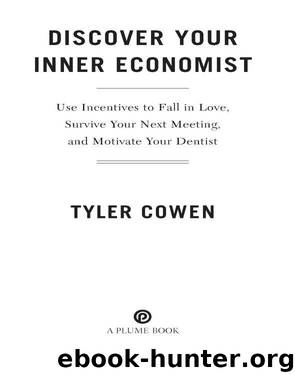Discover Your Inner Economist: Use Incentives to Fall in Love, Survive Your Next Meeting, and Motivate Your Den Tist by Tyler Cowen

Author:Tyler Cowen [Cowen, Tyler]
Language: eng
Format: epub
Tags: Success, Economics, General, Self-Help, Personal Growth, Business & Economics
ISBN: 9781440631085
Google: NaxsePmiMuQC
Publisher: Penguin
Published: 2008-05-27T21:15:54+00:00
Libel law prevents me from reproducing many of the other entries on this Web site. But just think, people talk and think about us—all the time—the exact same way that we talk and think about them. That is an uncomfortable prospect, no? Now put it out of mind and continue reading.
The key to doing well is to keep our self-deception as a general buffer, but to overcome it selectively for specific problems.
Small changes in incentives can make a big difference in our beliefs. For instance, UFO sightings are down dramatically in the last decade. Perhaps science-fiction movies are not as compelling as they used to be, but I think another factor is at work: cell phones and cell-phone cameras.
“The spaceship was in a no-call dead zone? And you didn’t snap a picture?”
“I’m sorry, honey. They immobilized my fingers with their secret ray guns.”
The story is suddenly a little harder to swallow. Most of all, it is harder to fool oneself, not just one’s spouse and friends. Researchers who have studied reported episodes of alien abduction have concluded that most of the believers are fully sincere.
We can make more mundane improvements. Many of us should drastically limit the number of errands we run. At the very least we should not let ourselves feel good about accomplishing errands. Often we let errands take up the day, if only to avoid facing more difficult problems, such as calling an angry client, finishing a dissertation, or fixing the roof. Errands are most dangerous when we self-deceive ourselves into feeling we are accomplishing something.
We are getting something done, it’s just the wrong thing. Many children don’t study hard for tests, so they can have an excuse if they don’t do well. We put our egos on the line when we try hard. For this reason, parents don’t always get better performance out of their children by increasing rewards and punishments for good and bad grades. The more there is on the line, the more the child feels pressured. The response is often self-sabotaging behavior to take off the psychological heat. The child adopts the self-deceiving mantra, “School isn’t that important anyway.” Raising rewards and punishments pushes the child into more self-deception, precisely when more self-reflection is needed instead.
As a general principle, trying to puncture people’s delusions does not always make them better off. Often we switch into other, less-easy-to-refute but more harmful delusions.
In at least one way, life in the former Soviet Union was remarkably easy. If something went wrong, Soviet citizens always had something or somebody—other than themselves—to blame. The Communist Party really was at fault. Even chess players had this excuse, since it is believed that tournaments or matches were sometimes thrown to “party favorites.” Of course the downside was that many Russians grew to accept or even welcome their political repression.
A capitalist economy, with its meritocratic pretensions, does not offer the same excuses for poor performance. When we fail under capitalism, we are led to think, rightly or wrongly, that we just weren’t as good as our competitors.
Download
This site does not store any files on its server. We only index and link to content provided by other sites. Please contact the content providers to delete copyright contents if any and email us, we'll remove relevant links or contents immediately.
International Integration of the Brazilian Economy by Elias C. Grivoyannis(111010)
The Radium Girls by Kate Moore(12019)
Turbulence by E. J. Noyes(8040)
Nudge - Improving Decisions about Health, Wealth, and Happiness by Thaler Sunstein(7694)
The Black Swan by Nassim Nicholas Taleb(7113)
Rich Dad Poor Dad by Robert T. Kiyosaki(6613)
Pioneering Portfolio Management by David F. Swensen(6291)
Man-made Catastrophes and Risk Information Concealment by Dmitry Chernov & Didier Sornette(6010)
Zero to One by Peter Thiel(5789)
Secrecy World by Jake Bernstein(4743)
Millionaire: The Philanderer, Gambler, and Duelist Who Invented Modern Finance by Janet Gleeson(4471)
The Age of Surveillance Capitalism by Shoshana Zuboff(4281)
Skin in the Game by Nassim Nicholas Taleb(4240)
The Money Culture by Michael Lewis(4198)
Bullshit Jobs by David Graeber(4180)
Skin in the Game: Hidden Asymmetries in Daily Life by Nassim Nicholas Taleb(3993)
The Dhandho Investor by Mohnish Pabrai(3760)
The Wisdom of Finance by Mihir Desai(3736)
Blockchain Basics by Daniel Drescher(3574)
